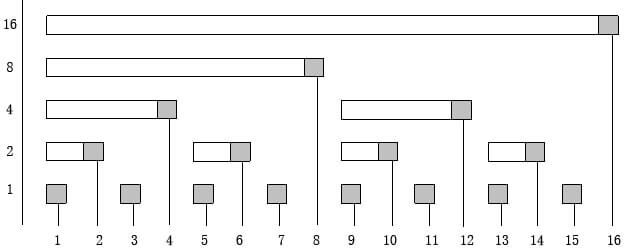Segment Tree
Cosider using other algorithms before using it.
A solution for leetcode 699: Falling Squares
class SegTree:def __init__(self, nums: List[int]):# init the tree with intervals, nums can be sorted endpoints of themk = len(nums)if k <= 1:self.n = 0returnk -= 1self.n = n = int(math.pow(2,int(math.ceil(math.log(k,2)))))self.data = data = [[0,0,0,0] for i in range(2*n)] # [left, right, data1, data2]data[n:n+k] = [[nums[i],nums[i+1],0,0] for i in range(k)] # intervals of the leavesfor i in range(n-1,0,-1):data[i][1] = max(data[2*i][1], data[2*i+1][1])data[i][0] = data[2*i][0]def update(self, i: int, j: int, val: int, start: int=1) -> None:# there can be two cases:# 1. update a node, then update bottom up (starting from one of the leaves)# 2. update an interval, then update top down (starting from the root)if start >= 2* self.n:returnl,r = self.data[start][:2]if j <= l or i >= r:returnself.data[start][2] = max(val, self.data[start][2]) # max heightif i <=l and j >= r:self.data[start][3] = max(val, self.data[start][3]) # min heightreturnif start >= self.n:returnself.update(i, j, val, 2 * start)self.update(i, j, val, 2 * start + 1)def query(self, i: int, j: int, begin:int = 1) -> int:# there can be two cases:# 1. query one interval# 2. query one pointif begin >= 2* self.n:return 0l,r = self.data[begin][:2]if j <= l or i >= r:return 0if i <= l and j >= r:return self.data[begin][2]return max(self.data[begin][3], self.query(i,j,2*begin),self.query(i,j,2*begin+1))
Fenwick Tree
It is also called Binary Indexed Tree (树状数组)
The problem can be soved by this often can be solved by segment tree.
Implementation

n的二进制最后一个1对应的值为: lowbit(n) = n&(-n)
注意起始从1开始,不是从0开始
class FenwickTree:def __init__(self, n):self.sum_array = [0] * (n + 1)self.n = ndef lowbit(self, x):return x & -xdef add(self, x, val):while x <= self.n:self.sum_array[x] += valx += self.lowbit(x)def sum(self, x):res = 0while x > 0:res += self.sum_array[x]x -= self.lowbit(x)return res
Problems
Leetcode 493: 链接
Leetcode 315: Count of Smaller Numbers After Self
Leetcode 327: count of range sum

